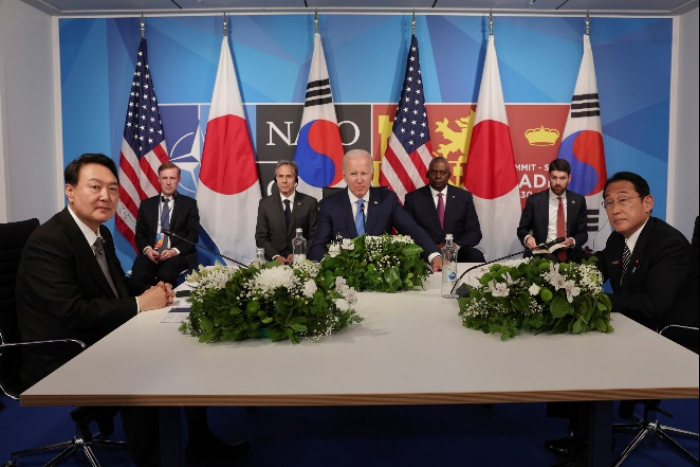Biden and leaders of Japan and South Korea pledge greater cooperation
Tokyo-Seoul relations are on a tentative recovery path after deteriorating in recent years
By The Wall Street Journal Jul 06, 2022 (Gmt+09:00)
LG Chem to sell water filter business to Glenwood PE for $692 million


Kyobo Life poised to buy Japan’s SBI Group-owned savings bank


KT&G eyes overseas M&A after rejecting activist fund's offer


StockX in merger talks with Naver’s online reseller Kream


Mirae Asset to be named Korea Post’s core real estate fund operator



President Biden met with the heads of Japan and South Korea—the first such gathering between the three countries’ leaders in nearly five years—and pledged deeper cooperation to counter North Korea’s weapons provocations.
The Wednesday meeting, on the sidelines of the North Atlantic Treaty Organization summit in Madrid, was another example of increased coordination between Washington and two of its key Asian allies. Tokyo-Seoul relations are on a tentative recovery path after deteriorating in recent years over historical grievances and trade disputes.
Fresh leadership in both countries has injected hope for a diplomatic reset. Japanese Prime Minister Fumio Kishida took office in October, while South Korean President Yoon Suk-yeol was inaugurated last month. Both are conservatives. The two spoke briefly at a Tuesday gala dinner, with Mr. Yoon expressing a desire to move forward in a “future-oriented manner,” according to South Korea’s presidential office.
Mr. Biden met the two leaders during separate stops to Seoul and Tokyo during his first presidential trip to Asia last month. The heads of the U.S., Japan and South Korea hadn’t met together since September 2017, coming shortly after North Korea conducted its sixth, and most recent, nuclear test.
“Our trilateral cooperation, in my view, is essential to achieving our shared objective, including a complete denuclearization of the Korean Peninsula and a free and open Indo-Pacific,” Mr. Biden said.
Mr. Yoon, embarking on his first overseas trip as president, said there is an even greater importance for cooperation between the U.S., Japan and South Korea due to North Korea’s weapons advances. The three countries’ alliance should be an “important central axis for world peace and stability,” Mr. Yoon said.
Earlier this month, the defense ministers of the three countries agreed to hold joint military drills to improve their detection and response to North Korean missile launches. On Wednesday, Mr. Kishida said the three nations would also strengthen military coordination if North Korea conducts a seventh nuclear test, which American and South Korean government officials believe is a likely prospect.
“It’s essential that Japan, the U.S. and South Korea work closely together,” Mr. Kishida said.
While emphasizing close cooperation with South Korea over threats from the North, Mr. Kishida has been cautious about holding bilateral talks with Mr. Yoon because of lingering historical disputes between Tokyo and Seoul. Mr. Yoon has pledged to overcome those disagreements.
Friction between Japan and South Korea is a headache for the U.S., which wants a united front with its allies to counter North Korea and the growing power and influence of China in Asia.
North Korea’s flurry of missile tests this year—more than in 2020 and 2021 combined—have helped catalyze greater military coordination between Washington, Tokyo and Seoul.
In April, Washington and Tokyo carried out joint naval exercises in the waters between Japan and the Korean Peninsula. Messrs. Biden and Yoon, at their meeting in Seoul, agreed to expand joint military drills and committed to the deployment of strategic American military assets to South Korea to counter North Korea’s threats.
North Korea, in a Wednesday state media report, criticized South Korea and Japan for “kowtowing to the U.S.” and called their increased closeness a dangerous prelude to the creation of an “Asian version of NATO.” Last week, Mr. Kim decided with senior military leaders to bolster front-line defenses and approved a further strengthening of the country’s weapons program.
Japan, South Korea, Australia and New Zealand were invited to the NATO summit as the group’s Asia-Pacific partners. Chinese Foreign Ministry spokesman Wang Wenbin voiced opposition last week to the four countries’ attendance, saying the Asia-Pacific region is “beyond the geographical scope of the North Atlantic.”
Security issues between Europe and Asia look more overlapping in nature now, from contending with tighter ties between Moscow and Beijing, to the shared challenges of soaring food and energy prices emerging in the aftermath of Russia’s invasion of Ukraine, said Mason Richey, an international politics professor at Hankuk University of Foreign Studies in Seoul. That means the U.S. will look to use alliances in a more inter-regional way, he said.
-Tarini Parti contributed to this article.
Write to Timothy W Martin and Alastair Gale at timothy.martin@wsj.com
-

-
 EconomySouth Korea to boost aid for chipmakers to $23 billion, expanding extra budget
EconomySouth Korea to boost aid for chipmakers to $23 billion, expanding extra budgetApr 16, 2025 (Gmt+09:00)
-
 AutomobilesSouth Korea announces emergency support for auto sector against US tariffs
AutomobilesSouth Korea announces emergency support for auto sector against US tariffsApr 09, 2025 (Gmt+09:00)
-
 EconomyChina says it is aiming to coordinate tariff response with Japan, South Korea
EconomyChina says it is aiming to coordinate tariff response with Japan, South KoreaApr 02, 2025 (Gmt+09:00)
-



